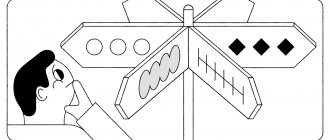Fear should motivate us to act at a specific moment when our life, health or well-being is in danger. If we worry about something that may happen in the future, it drags on for a long time and becomes harmful.
Chronic and acute stress and the prediction of major depression in women can worsen existing problems such as depression or anxiety, as well as cause Association of Job Insecurity with Health Risk Factors and Poorer Health in American Workers unpleasant physical symptoms: headaches, problems with sleep and digestion.
Chronic stress also negatively impacts The Impact of Stress on Cognition and Motivation on our cognitive abilities. Under its influence, it is more difficult to concentrate, complete tasks and find solutions. Relationships with others also suffer from constant anxiety: we become more irritable and lash out at colleagues or loved ones.
Here's what will help you cope with the fear of being unemployed and the stress it leads to.
Admit to yourself that you are afraid
Usually we don’t want to experience negative emotions, we avoid them. And in general, we are accustomed to believing that in order to achieve success, we must not stand still, but always run forward. So it's only natural that we don't want to slow down and face our fear. But it is necessary.
Don't try to hide this feeling deeper, but acknowledge it. Describe your emotions on paper, talk to a friend or colleague you trust. Most likely, you will see that you are not alone, and others are experiencing the same thing.
Symptoms
The crisis is becoming a huge challenge for many people. The fear of being left without a livelihood due to job loss is also complemented by worries that it will be difficult to find a new job. The behavior of such a person becomes aggressive.
Symptoms of fear manifest themselves at the level of the somatic nervous system. They cannot be controlled by humans. The following symptoms appear:
- heavy sweating;
- rapid heartbeat, as well as a sharp increase in blood pressure;
- headaches, dizziness and even darkening of the eyes;
- tremor of hands and feet;
- sore throat;
- stomach upset;
- decreased or increased appetite.
The presence of such symptoms indicates the initial stage of development of fear of job loss. Then more noticeable manifestations begin to appear. Some make involuntary movements with their arms, legs or head, others become quiet, experiencing all this inside.
There is also aggression directed at others. Sometimes fear about losing a job can also become a kind of impetus for professional development.
Increased appetite may be associated with fear
Ask your manager what useful things you can do now
This will help you focus on what is in your control, rather than on what you cannot control anyway. For example, ask questions like these:
- What three results would you like to see from me by the end of the month?
- What can I do to make this week more effective?
- After what actions of mine could it be said that the team could not cope without me?
Focus on what you can influence and what you are good at. This proactive approach will be an antidote to fear and will give you strength.
Independent ways to deal with the fear of losing your source of income
The following psychological adjustment techniques will help people who are haunted by the fear of unemployment.
Realize the illusory nature of fear
It is normal for a person to be afraid. The main thing is to understand how real the fear is. Imagine: we are walking peacefully in the park. Suddenly a tiger jumped out of the bushes. Here, of course, the wild horror and heart-rending scream are completely justified. But if there is a fear of being unemployed, this tiger may be paper, just a figment of fantasy. Therefore, always remember: the status of being unemployed is not much like a “zombie apocalypse”; finding a new job and retraining is not difficult.
Put the tiger on a chain, beat the fear with psychoanalytic logic. Maybe a colleague was recently fired for no reason, or a relative was laid off? Suddenly it began to seem: you are next. But this is complete stupidity, born of the fear of being left without money, the fear of ending up broke.
It’s also a good idea to have a collegiate conversation. Then, to your surprise, you will discover: many co-workers are also afraid to be on the street, they worry that their boss is dissatisfied with them. You are far from alone. Remember: a leader deals with “big-picture” things. The boss is dissatisfied “globally”, with the whole process, and not with someone personally.
Create a financial safety net
Are thoughts of losing your job depriving you of sleep? Create a financial safety net. Start spending less and putting more in the bank. In six months to a year of small savings, a good amount will accrue. A solid bank deposit will give you confidence. When you find funds for successful investments (real estate, securities), then dismissal will not be scary at all. The fear of losing your job will dissipate.
Build an alternate airfield
Are you terrified of layoffs? Make irrational fear useful. Start learning a new specialty and looking for another job. Write a resume, go to interviews, probe the labor market. Even when they fire you, there will be nothing to fear, because you will build a “reserve airfield” in advance. You will become more decisive, informed, stop being afraid of interviews, and find out which companies need you.
Find out about the employer's health
Be sure to find out if the company you work for is healthy. Isn't he incurring big losses? Does the company have any problems? Then the fear is groundless. If things are going badly for your employer, start looking for a new job.
Detach your “I” from work
If you lose 5,000 rubles, will you also lose your Self? Of course not! It's the same with work. You are not a job. Your own individuality is much more important than earnings and positions. Think a little about your own life and goals. Remember your loved ones, friends, hobbies. Reflect on personal good qualities - patience, caring, honesty. It's all of you. There is no escape from losing your job.
Learn to value your contribution
The fear of being laid off is associated with underestimating one's own efforts. Remember more often everything useful that you have done for the company, learn to see your own unique contribution to its development, stop perceiving yourself as a simple cog that can be easily replaced with another. Periodically celebrate everything you have achieved, thank yourself for your achievements. Even such praise is a pretty good incentive to move forward. This way you will gain confidence, know your own worth, and reduce the fear of being left without a job.
Treat quitting as a chance to do better.
Forget the stupid thing: “a tit is better than a crane.” Think: do you really need this “tit”? Especially if it brings so much stress and steals your peace of mind? Maybe it's better to do something else. More interesting, less stressful. Let it be less profitable at first.
And think about the “great quitters” who took the risk of quitting their jobs. About JK Rowling - Harry Potter's "mother". Before starting to create her bestseller, the famous writer even lost her own home, not to mention her job! Financier Michael Bloomberg also bravely decided to give up everything. The future billionaire fearlessly left a cushy position in an investment bank, and with the financial “golden parachute” he was given, he founded one of the most successful companies providing financial information.
Take vacations regularly
Without normal rest, psychological burnout and overload will very soon set in, and the fear of losing your job will increasingly begin to annoy you. Everyone needs to recuperate from time to time. Forget about emails, phone calls, negotiations, tasks. Do something easy, relaxing - your favorite hobby, relax, spend a pleasant evening with family and friends.
See a Psychotherapist
Different specialists have different methods of overcoming the fear of losing their job and the fear of being left with empty pockets. The most effective are considered:
- cognitive-behavioral adjustment;
- psychoanalytic identification of the “center” of fear;
- hypnotherapy.
A behavioral specialist, using leading questions, will find out the causes of the phobia. Then he will teach the patient to treat fear differently. He will give specific examples and explain the groundlessness of fear.
The psychoanalyst, together with the client, will delve into the distant past, find the cause of the phobia, help sublimate the fear, and turn it into an incentive for development.
The hypnotherapist, using positive attitudes, will instill confidence in the patient and teach him to ignore the phobia. Nikita Valerievich Baturin, a practical psychologist-hypnologist, has been successfully helping people for many years who are tormented by the fear of being left without money (and other fears and phobias). With the help of hypnosis and processing of sensations, this specialist frees you from the fear that poisons your life.
The fear of losing a job will go away when we begin to value ourselves, regardless of whether we have a job or not, and value our own skills, abilities, and positive character traits. If we understand: there are many places where they are willing to pay generously for our professionalism.
Take care of yourself
You may have to work late or on weekends to keep your job. Add to this anxiety about family, health and the future in general - it’s not far from burnout. To avoid this, take at least 15-20 minutes a day to take care of yourself.
Get some air, cook your favorite food, listen to music or podcasts, meditate, play with your pet, read a few pages of a book, exercise, go to bed a little earlier - all this will help you feel more stable. And even if the worst happens and you lose your job, it will be easier for you to survive the difficulties.
Reasons for changing jobs
It is believed that you need to change jobs every five years. Then the person will grow as a professional. There is another opinion: a person should work in one place all his life, because an organization is a family that does not change. Why you need to get a new job:
- Work as a habit. A person does not receive pleasure from it: he performs his duties automatically.
- Lack of professional growth. A person realizes that all goals have been achieved and there is nowhere to grow.
- Tense atmosphere in the team. Management behaves incorrectly towards employees, employees act dishonestly.
- Low salary. The wages are really very low compared to other companies.
- Constant changes. The company is undergoing transformations. This does not allow you to live in peace - there is no stability.
- Indifference to work activity. You have become uninterested - changing your profession is easier than you think.
By the way
Stress caused by dismissal is more pronounced in men. Women are more resilient to the blows of fate and react flexibly to stressful situations. People of retirement age, as well as those who cross the “dangerous” age limits, experience the loss of work very painfully: the so-called age of first adulthood (33-35/35-37 years) and mature age – 46-48/52-54.
The level of stress experienced also depends on the psychological type to which a person belongs. Temperamental, sociable people, although they take the news of dismissal hard, overcome the stressful situation relatively quickly. As a rule, two weeks are enough for them to be free from stress. Another thing is that people are phlegmatic and withdrawn. Their stress develops progressively and lasts for a long period.
Interesting
● No one is immune from dramatic turns of fate. Even geniuses. The example of one of the players of the Real Madrid football club is widely known. A freak car accident confined him to a wheelchair for a whole year. In the end, he managed to get back on his feet, but had to say goodbye to his brilliant football career. “What to do? After all, I don’t know how to do anything besides football!” – the former football player was tormented. Friends advised him to try himself in... the singing genre. And they were right. This is how the brilliant Julio Iglesias appeared to the world.
● The story of another famous person is no less significant. Before becoming famous in the literary field, he was... an accountant. Everything changed when the unknown Mr. Porter was accused of embezzlement and went to prison. Out of melancholy and hopelessness, he began to write stories. He emerged from prison as a popular short story writer known under the pseudonym O'Henry.
Don't isolate yourself
Unfortunately, often during a period of forced inactivity, a person’s relationships with loved ones deteriorate. At first they sympathize with him, but as he withdraws and becomes depressed, this begins to irritate those around him. ● Try not to be excluded from family life: take on some responsibilities that were previously performed by others, share your thoughts, discuss household problems.
● If friends invite you to visit, do not refuse, citing a bad mood. Maybe that's where you'll meet someone who can help you find a job. Despite progress in the field of employment (Internet, recruiting agencies), they prefer to hire us, as before, “by acquaintance.”
● Don't neglect a temporary job offer while continuing to look for a permanent one. If you prove yourself well, it can become permanent.











